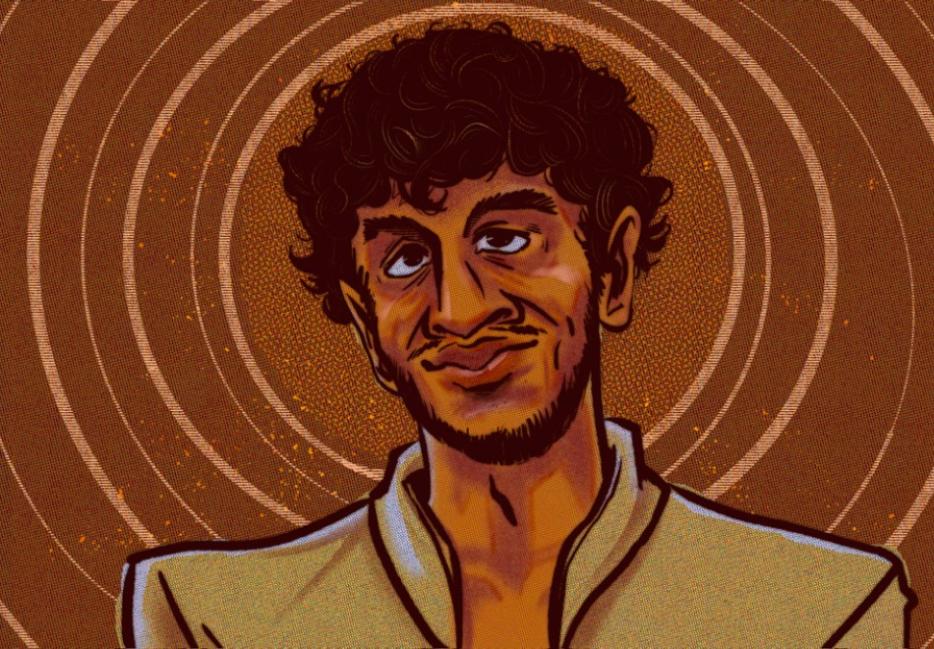Welcome to Wayward Watching, a column on the seen and unseen in film.
Allow me to set the scene. A sprawling chain bookstore, occupying one corner of an iconic traffic intersection in Bombay. Two men in security uniforms at the door. Red couches on the giant display windows. Ten years ago, if a camera—perchance perched on the terrace of a ritzy apartment in neighbouring Cumballa Hill, or the Zoroastrian Tower of Silence across the street—had zoomed into one of those couches on consecutive afternoons, it would have inevitably framed the same lanky college kid in shorts, with a load of magazines and hardbacks on his lap, reading until the men at the door had changed out of their uniforms and started rolling the shutters down at nine.
If I didn’t answer their texts, my friends knew where to find me. They’d scan the display windows from the pavement and tap on the glass. “Haven’t you finished reading every page here?” One classmate would often exclaim aloud, wanting to embarrass me inside the store. He’d rather have me ride pillion on his motorcycle, two boys swishing around helmetless in the city traffic for hours. I certainly wished I had finished reading more: the Library of America tomes of John Updike’s early fiction and Susan Sontag’s essays, unaffordable in Indian rupees; Richard Ellmann’s never-ending biography of James Joyce; the shelf that stacked every novel longlisted for the Booker Prize in the past five years; and in the hour before closing time, short stories in the latest New Yorker and Harper’s, which I still consequently think of as not short enough. The store manager, to his credit, never made feel like an interloper. He must have noticed that I only ever queued up at the counter during a sale, or sometimes after the music agent I assisted part time paid me in cash every few weeks. And yet the employees left my couch alone each time they fell short of chairs during readings. Across my thousand or so visits over five years, the single occasion the manager—one of those burly, work-obsessed men who only ever wear Oxford shirts and ties—acknowledged my presence in the shop was when he thrust into my hands a book by Martin Amis.
I remember I was trying to pacify my motorcyclist friend who had just asked an employee why he couldn’t find a copy of The Hangover in the DVD section. The employee didn’t reply, and my friend was affronted enough to demand that we leave at once. Moments later, the manager approached our couch with a copy of The War Against Cliché, Amis’s 2001 collection of essays, and opened it up to a piece on movie adaptations of Jane Austen’s novels. “Read this,” he gave me an imploring look, and then disappeared before my friend could ask him about The Hangover again. Later, reading the piece, I noticed that Amis began with an account of watching Four Weddings and a Funeral inside a London theatre with Salman Rushdie:
“Well,” I said, when it was over, “that was bottomlessly horrible. Why is it so popular?”
“Because,” said Salman, “the world has bad taste. Didn’t you know that?”
I didn’t count myself among the ones with bad taste. And so, prompted by the manager, I skulked at the bookstore over the next few months near the shelf that stocked Amis’s work. I began with the film journalism, scattered intermittently over his multiple essay collections—mostly because I thought I’d grow up and become a movie director in those days. Then I found out that John Self, the protagonist of Money, is also a wannabe filmmaker, and that got me going with the novels. Ever since Amis’s demise last month, obituaries have recalled his fanatic commitment to prose style (he once remarked that the Nobel laureate J.M. Coetzee had “no talent” because he wrote a sentence that went “She watched me like a hawk”); the delight and gnarly comedy of his voice on the page; his infectious gusto for the novels of Saul Bellow and Vladimir Nabokov; stories of his friendship with the late journalist Christopher Hitchens and their adventures in literary London in the ‘70s and early ‘80s. But the Amis I’ll miss most is the one who’d sit through a bad film in a theatre just so he could complain it was “bottomlessly horrible”; the unabashed dilettante who once wrote that he was thrilled by the onset of realistic fight sequences in films like Bonnie and Clyde and The Wild Bunch: “Violence had arrived. There was also, I noticed, a sudden flowering of sex and swearing. The future looked bright.”
Before Amis, I hadn’t read a writer who copped to the exhilaration of watching two people kiss or curse or kick each other onscreen. My sensibility was alternately molded by the artful gaze of practitioners (François Truffaut’s The Films In My Life, Satyajit Ray’s Our Films, Their Films) and the worldly erudition of critics (Andrew Sarris’s Confessions of a Cultist, Sontag’s Against Interpretation). Amis, you sensed, wanted to be with the onlookers in the lower stalls, counting down the minutes to the interval, or clasping his chair during an intense scene. He was, to be sure, more imposing and caustic while writing about literature, but when he mocked an author’s propensity for inelegant variation, or compared the experience of reading Don Quixote to “an indefinite visit from your most impossible senior relative,” you couldn’t shake the image of Amis poring over the text in question with a pencil in hand, glasses banally balanced on the nose. The pieces about movies were less anxious. The aspiring auteur in me often disagreed with the innocence and instant catharsis of his opinions, which is to say they were arguably more useful.
In 1982, Amis travelled to California to interview Steven Spielberg. E.T. had just been released in theatres and Amis, then in his thirties, apparently had an epiphany watching the children’s film:
Towards the end of E.T., barely able to support my own grief and bewilderment, I turned and looked down the aisle at my fellow sufferers: executive, black dude, Japanese businessman, punk, hippie, mother, teenager, child. Each face was a mask of tears. Staggering out, through a tundra of sodden hankies, I felt drained, pooped, squeezed dry; I felt as though I had lived out a year-long love affair—complete with desire and despair, passion and prostration—in the space of 120 minutes. And we weren't crying for the little extra-terrestrial… We were crying for our lost selves. This is the primal genius of Spielberg, and E.T. is the dearest demonstration of his universality. By now a billion Earthlings have seen his films. They have only one thing in common. They have all, at some stage, been children.
I did a double take when I first came across this passage. Is this the same writer who welcomed the inevitability of the death of a character while watching Four Weddings and a Funeral (“at least one of them was going to die”)? Once you read further on, however, you realize that Amis is more ambivalent about Spielberg’s tearjerking vision. He portrays the director—also then in his thirties—as a bit of a Peter Pan figure, a kid who played safe and never grew up. Spielberg’s beard “looks like a stick-on afterthought, a bid for adulthood and anonymity.” His offices in Burbank Studios make Amis wonder if he ever “left the chain-line, ranch-style embryos of his youth.” At one point, Amis asks Spielberg why there is scarcely any sexual tension in his movies, and Spielberg’s answer is unsurprisingly adolescent: “I think I have an incredibly erotic imagination. It’s one of my ambitions to make everyone in an 800-seat theatre come at the same time.” The tears were clearly not enough.
Amis seemed gullible a decade later when he showed up at John Travolta’s door after Pulp Fiction. Travolta was courteous to a fault, taking off Amis’s coat and “personally sliding it into a hanger,” letting him sit on the director’s chair on the set of Get Shorty, and feeding him pizza inside his lavish trailer. “My protective instincts are stirred,” Amis gushed. And a couple of sentences later: “By now, of course, I am ready to offer my mentorship to John—my words of advice.” Travolta’s affiliation with the Church of Scientology—an organization always in the news for its Hollywood clients, kooky beliefs and multiple allegations of tax fraud—was no more than a meditative practice. Amis was fed the stock PR line about the church being only concerned about its members’ mental well-being, and he was persuaded right away. “But Scientology is worldly,” he decided. “It teaches you how to pay the rent and not go crazy.”
Amis’s understanding of Islam was famously less charitable. In an unhinged three-part essay, first published in The Observer in 2006, he claimed to have abandoned a satirical novella (called “The Unknown Known”) because of “the freshly fortified suspicion that there exists on our planet a kind of human being who will become a Muslim in order to pursue suicide-mass murder.” Without bothering to talk to a single living Muslim, Amis decreed that they were driven by sexual frustration and were apparently resentful of the West’s libidinous liberties. The bigotry was new; but the sexual imagery, I thought, had its roots in a gonzo dispatch on the California porn industry that he published months before 9/11. Amis is weirdly at his most tender in that essay. His novels might feature too many vamps and double-crossing women, but when he met Chloe, the star of Welcome to Chloeville, he pushed back on her notion of being “a prostitute”:
No, Chloe, you are not a prostitute, not quite. Prostitution is the oldest profession. And porno is the newest profession. You are more like a gladiator: a contemporary gladiator. Of course, the gladiators were slaves—but some of them won their freedom. And you, I think, will win yours.
As a young literary critic, Amis was often impossible to please—Joan Didion, for instance, “writes about everything with the same doom-conscious yet faintly abstract intensity of interest”—but as a movie buff, he remained a connoisseur of popular tastes, someone not immune to sentimental charms. On the set of RoboCop 2, he was impressed not just by the geeky accomplishments of the crew, but also the fact that everyone knew who he was: “Even the continuity girl turns around and quotes me, word perfect…” Brian De Palma’s films were “an achievement of a kind, to fashion an art that appeals to the purist, the hooligan, and nobody else.” Was Amis on to something with these pronouncements? It almost doesn’t matter. Now that he is gone, the stubborn style, the acid wit, even the spells of narcissism, appear to have been a coping mechanism. Irony “doesn’t incite you to transform society,” he wrote in his essay on Austen. “It strengthens you to tolerate it.” And Amis was fortifying at his best, capable of turning out paragraphs that were at once skittish and sharply focused. Here he is, in his memoir Experience, recalling the beginning of the end of his father Kingsley Amis’s second marriage, during a midnight screening of The Mask of Fu Manchu:
Kingsley told me how it went. The whole day, he said, had been unusually enriched by the prospect of the Karloff classic (late screening). Dusk settled; midnight struck; and the film, when it came, was incredibly boring. He sat up, alone, for another hour, in what he described as “a trance of depression.” Something, he reasoned, must be missing from his life. And he decided that what was missing was London. He wanted to leave the big house… So the marriage might have been extended at least an additional twenty-four hours, if The Mask had been any good. As it turned out, the marriage would last another five years. But it was over, effectively, the minute those credits rolled.






